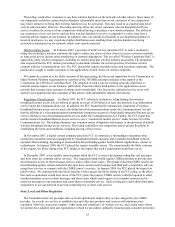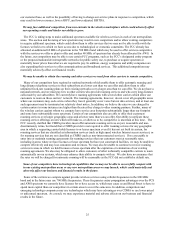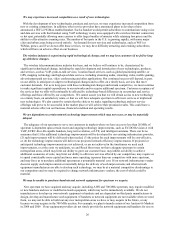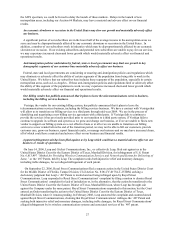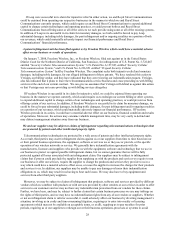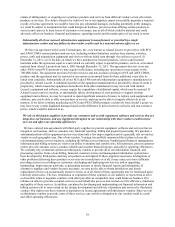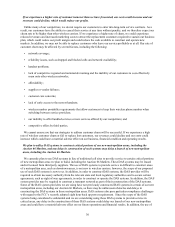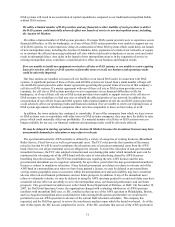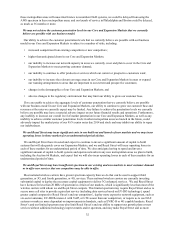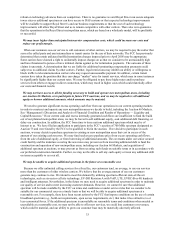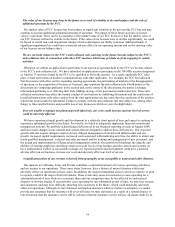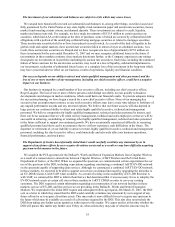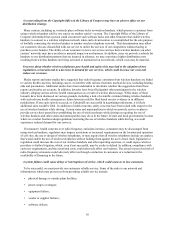Metro PCS 2007 Annual Report Download - page 42
Download and view the complete annual report
Please find page 42 of the 2007 Metro PCS annual report below. You can navigate through the pages in the report by either clicking on the pages listed below, or by using the keyword search tool below to find specific information within the annual report.31
DAS systems will result in an acceleration of capital expenditures compared to our traditional metropolitan builds
without DAS systems.
We utilize a limited number of DAS providers and any financial or other inability of such providers to deliver
the DAS systems could materially adversely affect our launch of service in new metropolitan areas, including,
the Auction 66 Markets.
We utilize a limited number of DAS system providers. If a major DAS system provider were to experience severe
financial difficulties, or file for bankruptcy, or if one of these DAS system providers were unable to support our use
of its DAS systems, we could experience delays in construction of these DAS systems which could delay our launch
of new metropolitan areas, including the Auction 66 Markets, delay expansion of certain of our networks, or require
us to construct the affected area using traditional cell sites which could result in duplicate or excess costs and could
result in substantial delays. Any delay in the launch of new metropolitan areas or in the expansion of service in
existing metropolitan areas, could have a material adverse effect on our business and financial results.
If we are unable to install our equipment on wireless cell sites or DAS systems, or are unable to renew expiring
leases for wireless cell sites or DAS systems on favorable terms or at all, our business and operating results
could be adversely impacted.
Our base stations are installed on leased cell site facilities or on leased DAS nodes in connection with DAS
systems. A significant portion of these cell sites and all DAS systems are leased from a small number of large cell
site and DAS system providers under master agreements governing the general terms of our use of that company’ s
cell sites or DAS systems. If a master agreement with one of these cell site or DAS system providers were to
terminate, the cell site or DAS system providers were to experience severe financial difficulties or file for
bankruptcy, or if one of these cell site or DAS system providers were unable to support our use of its cell sites or
DAS systems, we would have to find new sites or rebuild the affected portion of our network. In addition, the
concentration of our cell site leases and DAS systems with a limited number of cell site and DAS system providers
could adversely affect our operating results and financial condition if we are unable to renew our expiring leases or
DAS system agreements with these companies either on terms comparable to those we have today or at all.
In addition, the tower industry has continued to consolidate. If any of the companies from which we lease towers
or DAS systems were to consolidate with other tower or DAS systems companies, they may have the ability to raise
prices which could materially affect our profitability. If a material number of cell sites or DAS systems were no
longer available for our use, our financial condition and operating results could be adversely affected.
We may be delayed in starting operations in the Auction 66 Markets because the incumbent licensees may have
unreasonable demands for relocation or may refuse to relocate.
The spectrum allocated for AWS currently is utilized by a variety of categories of existing licensees (Broadband
Radio Service, Fixed Service) as well as governmental users. The FCC rules provide that a portion of the money
raised in Auction 66 will be used to reimburse the relocation costs of certain governmental users from the AWS
band. However, not all governmental users are obligated to relocate. To foster the relocation of non-governmental
incumbent licensees, the FCC also adopted a transition and cost sharing plan under which incumbent users can be
reimbursed for relocating out of the AWS band with the costs of relocation being shared by AWS licensees
benefiting from the relocation. The FCC has established rules requiring the new AWS licensee and the non-
governmental incumbent user to negotiate voluntarily for up to three years before the non-governmental incumbent
licensee is subject to mandatory relocation. If any federal government user delays or refuses to relocate out of the
AWS band in a metropolitan area where we have been granted a license, we may be delayed or prevented from
serving certain geographic areas or customers within the metropolitan area and such inability may have a material
adverse effect on our financial performance and our future prospects. In addition, if any of the incumbent users
refuse to voluntarily relocate, we may be delayed in using the AWS spectrum granted to us and such delay may have
a material adverse effect on our ability to serve the metropolitan areas, our financial performance, and our future
prospects. One government incumbent user is the United States Department of Defense, or DoD. On November 19,
2007, the DoD Joint Spectrum Center, the organization charged with evaluating whether use of AWS spectrum
interferes with incumbent DoD uses, or JSC, notified us that our use of the AWS spectrum in Philadelphia, Boston,
and Los Angeles metropolitan areas would interfere with existing DoD systems and therefore we would not be
permitted to use our AWS spectrum in advance of the current DoD relocation schedules. The company has
requested, and the DoD has agreed, to review the interference analyses upon which the denial was based. As of the
date of this report, the JSC has not completed its review. If the JSC concludes that our use of the AWS spectrum in



